This savory, satisfying yellow split pea dahl works equally well as the centerpiece of a simple meal or a component of a larger one. Don't miss it.
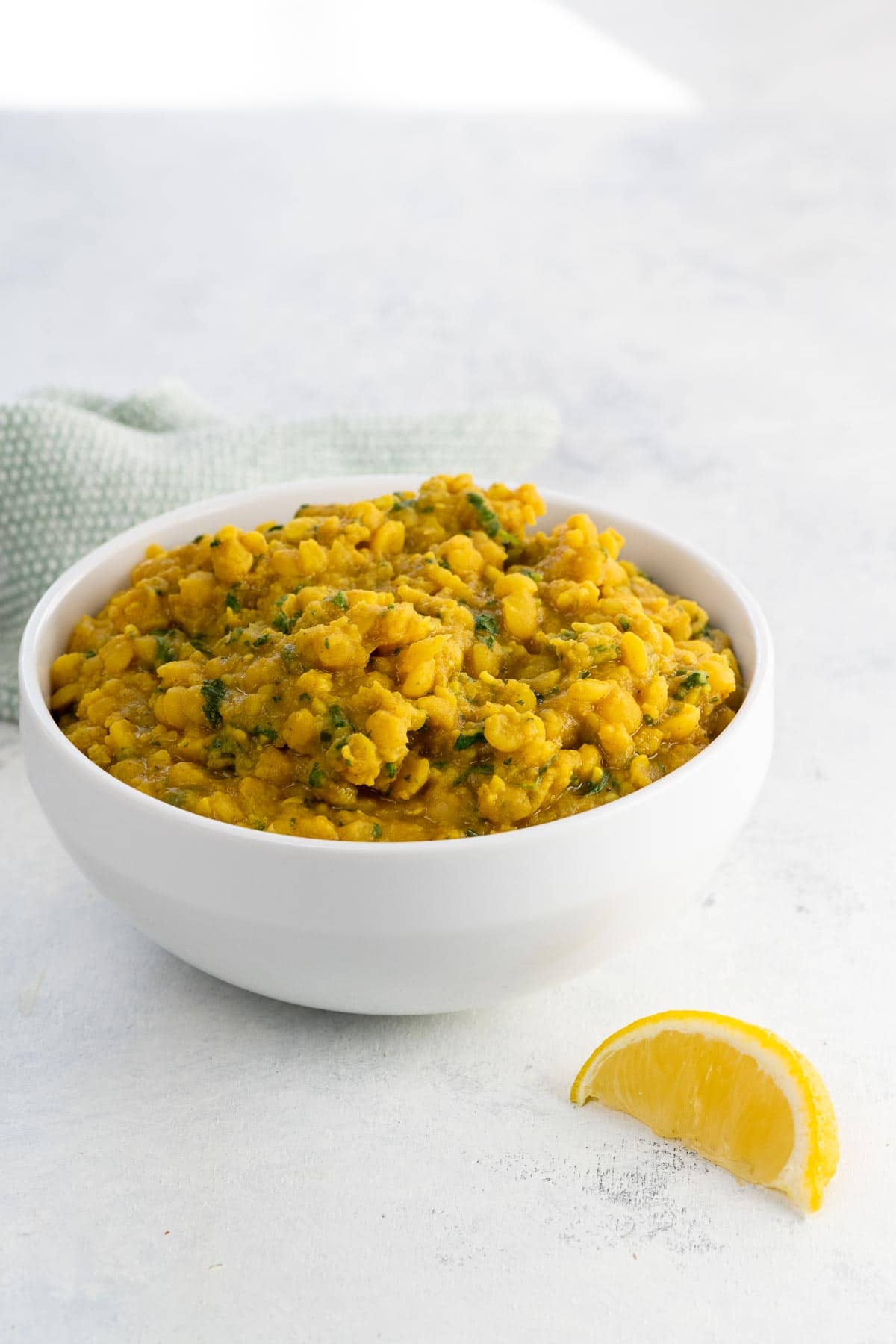
Why we love this recipe
Split peas are such an amenable ingredient that I sometimes forget about them entirely. That's never a good idea. They're comforting and satisfying and packed with unimpeachable nutrition.
In this riff on dahl, they get a savory vibe studded with ginger, garlic, lemon, and lots of cozy spices like cumin, cardamom, turmeric, and paprika. This recipe works beautifully as a main dish (with some simply cooked basmati rice and a vegetable), or as part of a more elaborate meal.
I first published this recipe here way back in 2012, inspired by Kalyn's Kitchen. I've since updated the post for clarity, but the recipe remains the same.
What you'll need
Here's a glance at the ingredients you'll need to make this recipe.
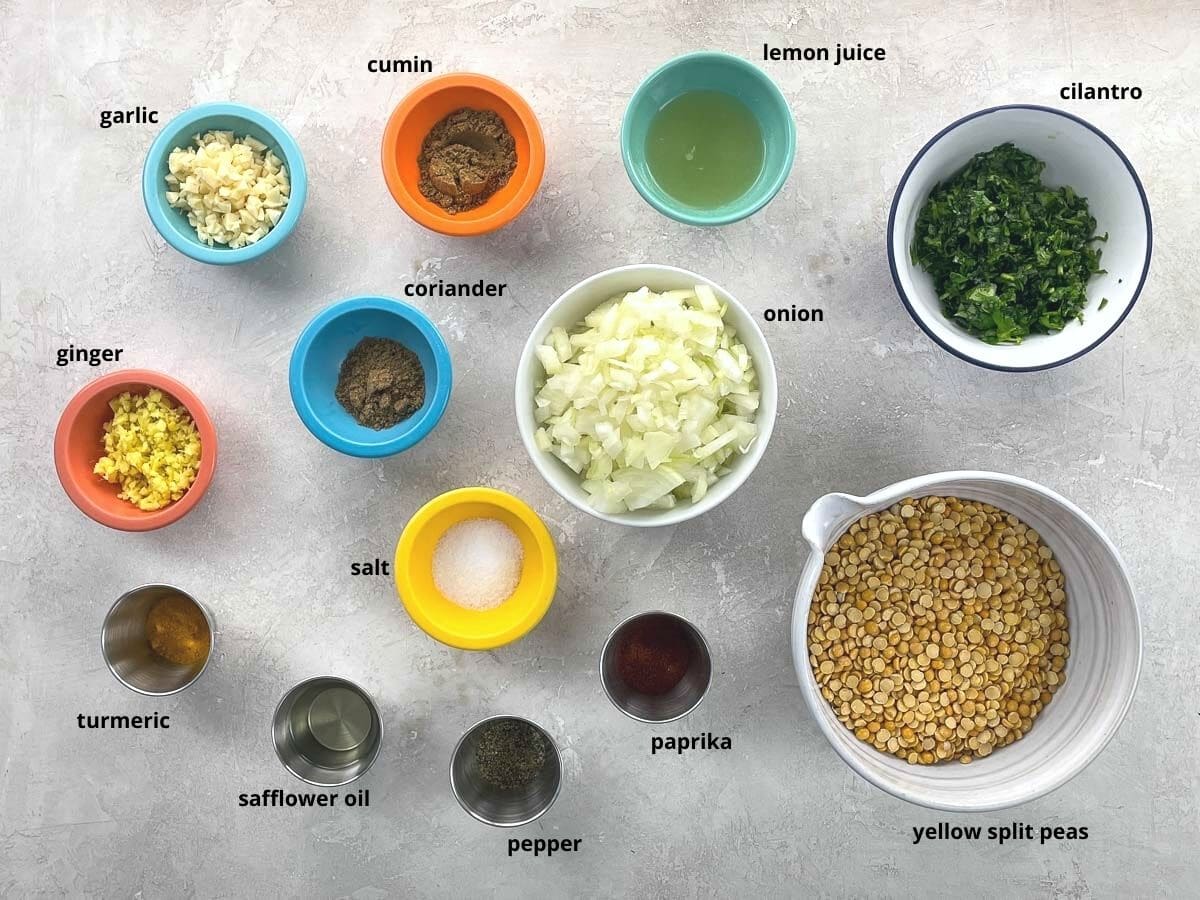
- This recipe uses yellow split peas/matar dal (Pisum sativum), which are generally easy to find in U.S. grocery stores and don't need to be soaked. They're a great source of protein and complex carbs. Note that, though they look similar, they're a different crop from split pigeon peas/toor dal (Cajanus cajan).
- Safflower oil is my high-smoke-point, neutral-tasting vegetable oil of choice. You can substitute another oil that has similar properties, such as canola, sunflower, peanut, corn, or vegetable oil blend.
- I haven't pictured water here, but you'll need 5 cups, as directed in the recipe card below.
How to make it
Here's an overview of what you'll do to make a great batch of split pea dahl. You can see the steps in action in the video that accompanies this post, and get all the details in the recipe card below.
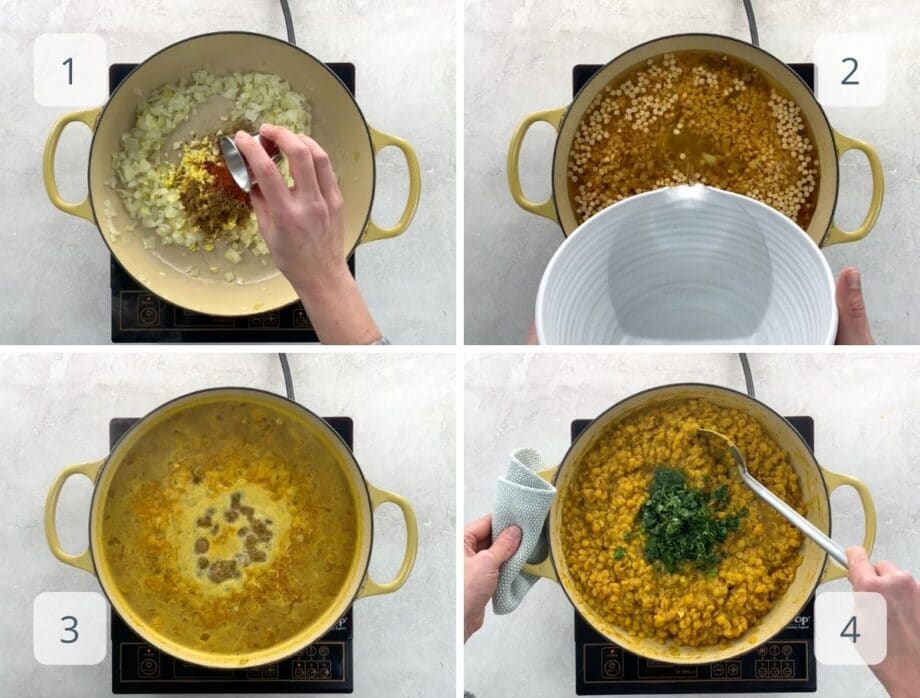
- First you'll cook the aromatics and seasonings in the oil.
- Add the split peas and the water, along with salt and pepper.
- Bring to a boil, then turn down the heat to simmer, and cover. Cook for about an hour, until split peas are tender.
- Off the heat, stir in the lemon juice and cilantro. That's it!
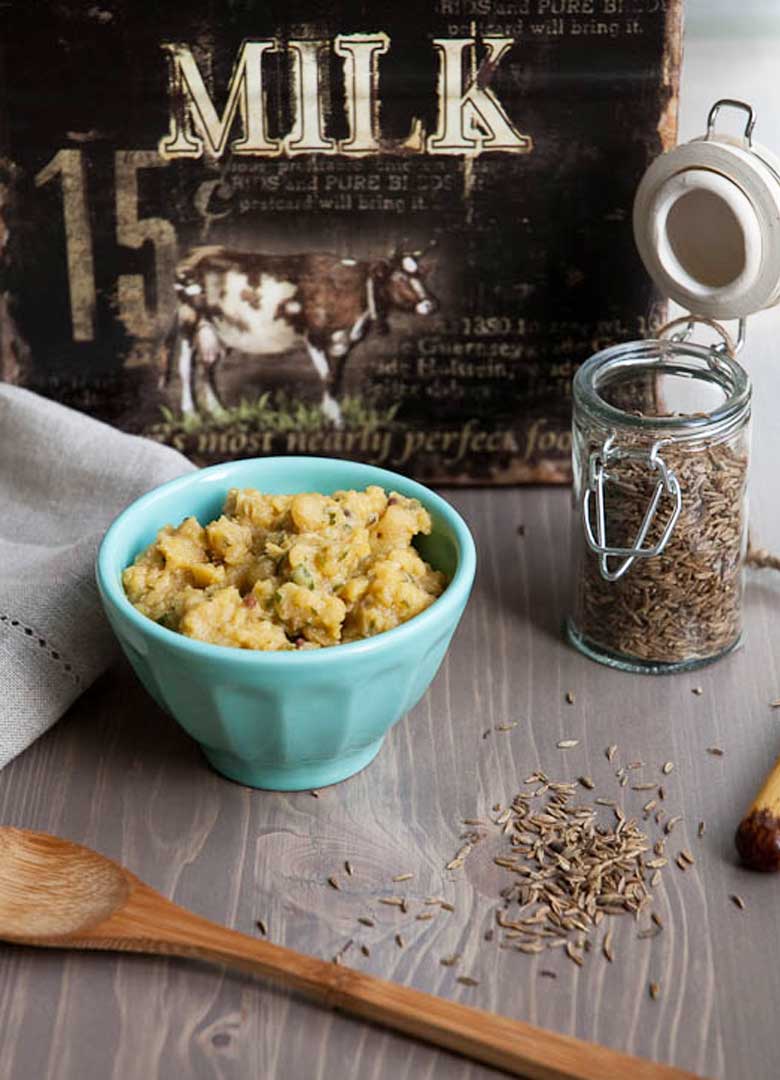
Expert tips and FAQs
Try to buy dried beans, peas, and lentils from stores that turn them over fairly quickly. Older dried legumes don't cook as quickly or — more important — as evenly as fresher ones.
You definitely can. Dahl keeps well in an airtight container in the fridge for a week or in the freezer for a year. The flavors will only improve as they have a chance to blend.
More favorite comforting legumes
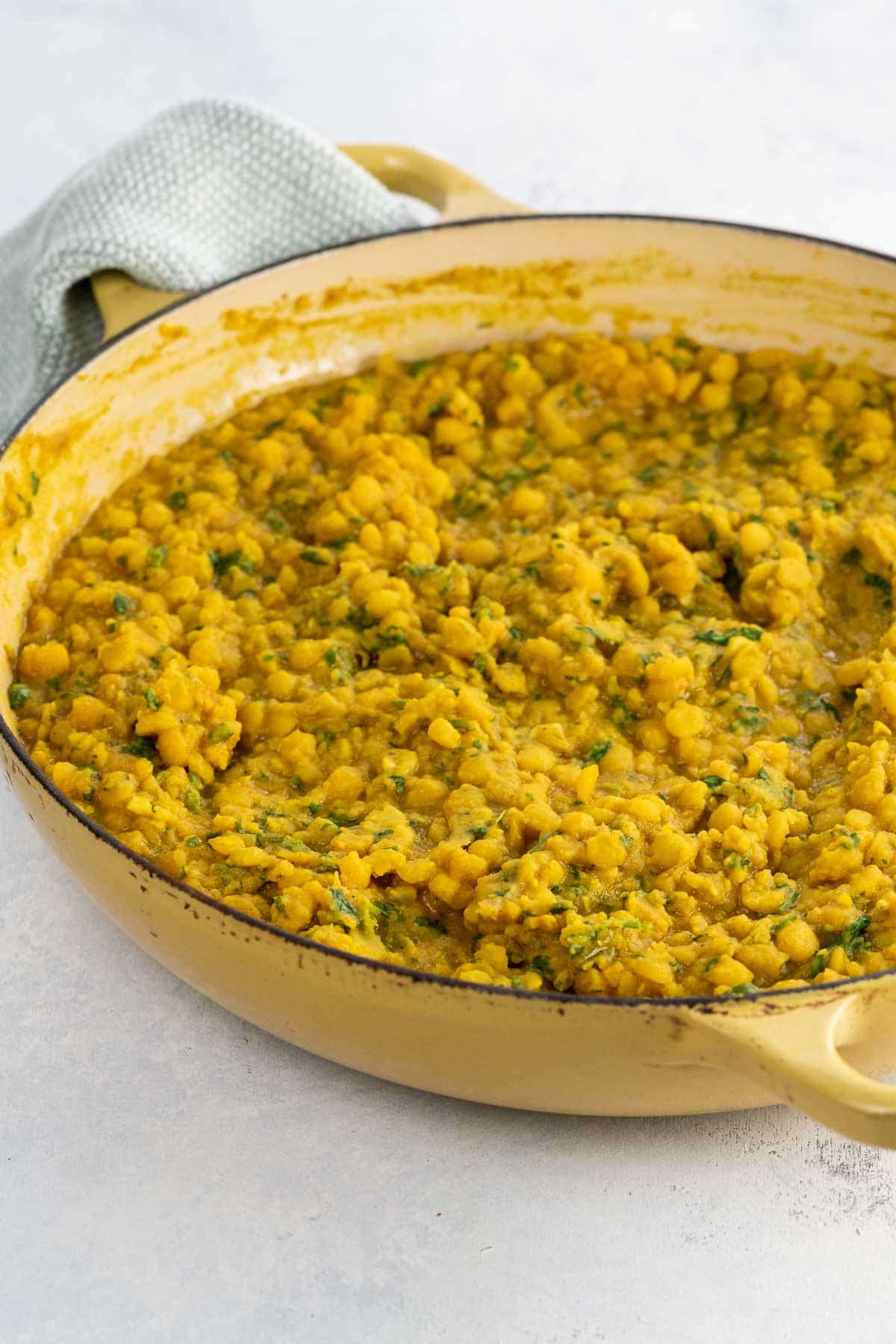
Hungry for more?
Subscribe to Umami Girl's email updates, and follow along on Instagram.
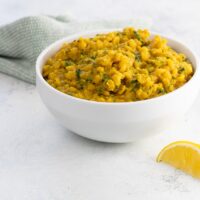
Yellow Split Pea Dahl
Ingredients
- 2 tablespoons (30 ml) safflower oil
- 1 large yellow onion (finely diced)
- 1 ½ teaspoons fine sea salt (divided)
- 8 cloves garlic (minced)
- One 1 ½-inch piece fresh ginger (about 25 grams, peeled and minced)
- 2 teaspoons ground cumin
- 2 teaspoons ground coriander
- 1 teaspoon ground paprika
- 1 teaspoon ground turmeric
- 2 ¾ cups (500 grams) yellow split peas
- 5 cups 1(200 ml) water
- ½ teaspoon freshly ground black pepper
- 3 tablespoons (45 ml) freshly squeezed lemon juice (from about one lemon)
- 1 cup chopped fresh cilantro
Instructions
- Heat the oil in a heavy 5-quart pot over medium-high heat.
- Add the onion along with about ½ teaspoon of the salt and cook, stirring occasionally, until softened, about 5 minutes.
- Add the garlic, ginger, cumin, coriander, paprika, and turmeric and cook, stirring constantly, for 60 seconds.
- Add the split peas, the remaining salt, pepper, and water. Give it all a good stir.
- Raise the heat to high and bring to a boil.
- Reduce the heat to maintain a simmer and cover the pot.
- Cook, stirring occasionally, until split peas are very tender and most have lost their defined shape, about an hour.
- Stir in lemon juice and cilantro.
Notes
- This recipe uses yellow split peas/matar dal (Pisum sativum), which are generally easy to find in U.S. grocery stores and don't need to be soaked. They're a great source of protein and complex carbs. Note that, though they look similar, they're a different crop from split pigeon peas/toor dal (Cajanus cajan).
- Safflower oil is my high-smoke-point, neutral-tasting vegetable oil of choice. You can substitute another oil that has similar properties, such as canola, sunflower, peanut, corn, or vegetable oil blend.
- Dahl keeps well in an airtight container in the fridge for a week or in the freezer for a year. The flavors will only improve as they have a chance to blend.
Nutrition
Hungry for more?
Subscribe to Umami Girl's email updates, and follow along on Instagram.


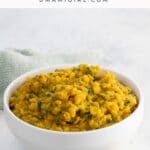
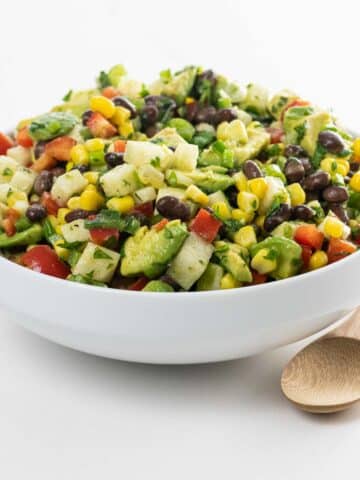
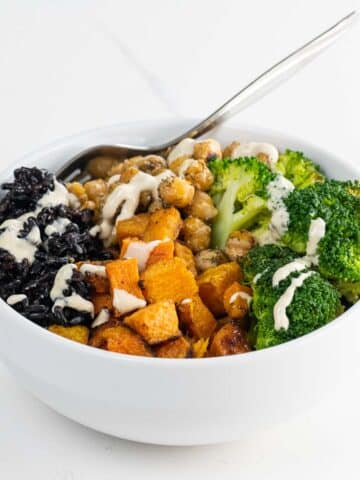
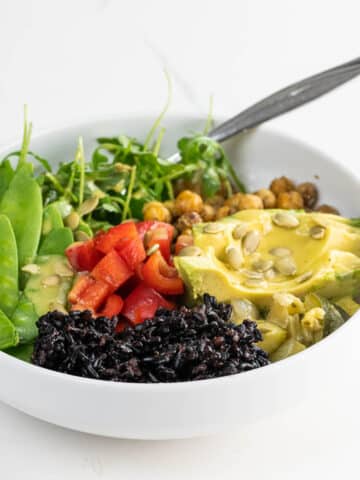
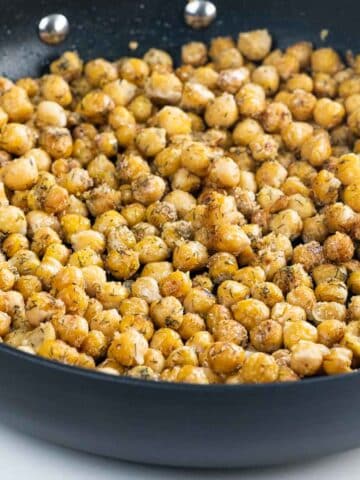

Anonymous says
Madame Fromage says
Hey there,
It's been a while since I visited your site. Beautiful redesign -- I look forward to your podcasts and future posts. Cheers!
anja says
hi carolyn, don`t know if you got my mail, so thanks again here for the great book which is a pleasure to read. have a good weekend!best from berlin, anja
Kankana says
Your mail made my day a lot brighter today 🙂 Reading the book now and totally in love with it!
As for the new look .. I LOVE IT. Neat and simple .. exactly how I like it 🙂
fastronomique says
This is such a fantastic recipe. I was once a nanny for a family from Chennai, so I'm pretty picky about da'al, and this is delicious. My local Indian grocer carries a pretty decent frozen version of paratha, so I served this as an appetizer alongside those. I used actual Indian coriander from World Spice Merchants (http://www.worldspice.com/spices/coriander-seed-indian) in mine, and I really think it makes all the difference. The Indian variety is very nuanced and has this citrus-y top note that really plays off that lemon and ginger. I get all of my cumin from WSM, too... as with anything, freshness really pays off- but most especially in Indian cooking! PS: Love the new look, too!
Carolyn says
Thank you kindly, everyone!
Jill says
So... first of all... I LOVE the new layout and design!!! So much so that I've discussed it with many friends (& family members)...
Second... YAY!!! I won! Can't wait to get reading!!!
and
Third... I can't wait to try this recipe!!! Sounds right up our alley! Yum!
and
last but not least... love the idea of a newsletter! & can't wait for April for your "Getting Started Guide"
:o)
City Share says
I really like the new design. The recipe looks good too. We have also been eating our fair share of lentils, but this is a flavor combination we haven't tried. Thanks for the inspiration.
Melissa says
Loving the new looks! Congrats on all your hard work -- well done! 🙂
Reem | Simply Reem says
Congrats on all the new and exciting stuff coming up....
I absolutely adore your new look!! Love love your LOGO..
Beautiful!!!
cheryl says
I absolutely adore your new design. It's cool, quiet, subdued, classy. Let's think of more adjectives: sophisticated, modern, and tranquil.
Congratulations on all the new offerings. Three cheers for innovation and pushing the needle forward. Delicioustan indeed.
Kalyn says
So glad you enjoyed the recipe, and your blog looks just amazing. Really like the new look.
sweet road says
Oh yum! I have had something like this... maybe this is what it was. I was at a potluck party and never found out what exactly the dish was, but it sounds very similar to this. I'll have to try this recipe and find out!
katie says
I love the new digs! Congrats on all the new stuff happening too!